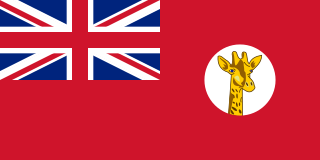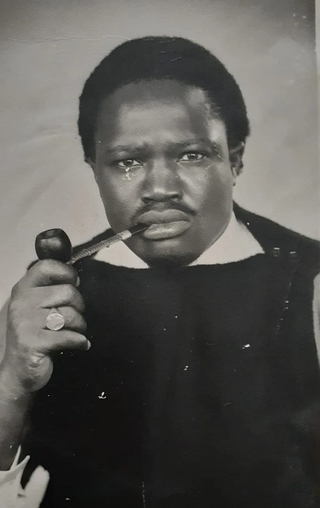 |
|---|
|
Economic schemes |
The Kenya Independence Movement (KIM) was a political party in Kenya.
 |
|---|
The Kenya Independence Movement (KIM) was a political party in Kenya.
The KIM was established in August 1959 by African members of the Legislative Council, and was led by Julius Gikonyo Kiano, Tom Mboya and Jaramogi Oginga Odinga. [1] Primarily a Kikuyu and Luo party, [2] its formation was a response to the establishment of the multiracial Kenya National Party, [1] and membership was restricted to Africans. [2] The two also differed on independence, with the KIM demanding it by 1961, whilst the KNP had settled on 1968.
However, by the end of 1959 supporters of the two merged in order to present a united front at the Lancaster House Conference. [1] The following year the KIM's leadership established the Kenya African National Union through a merger with the Kenya African Union and the National People's Convention Party, [3] [4] whilst the KNP merged with other parties to form the rival Kenya African Democratic Union.

The Kenya African National Union (KANU) is a Kenyan political party that ruled for nearly 40 years after Kenya's independence from British colonial rule in 1963 until its electoral loss in 2002. It was known as Kenya African Union (KAU) from 1944 but due to pressure from the colonial government, KAU changed its name to Kenya African Study Union (KASU) mainly because all political parties were banned in 1939 following the start of the Second World War. In 1946 KASU rebranded itself into KAU following the resignation of Harry Thuku as president due to internal differences between the moderates who wanted peaceful negotiations and the militants who wanted to use force, the latter forming the Aanake a forty, which later became the Mau Mau. His post was then occupied by James Gichuru, who stepped down for Jomo Kenyatta in 1947 as president of KAU. The KAU was banned by the colonial government from 1952 to 1960. It was re-established by James Gichuru in 1960 and renamed KANU on 14 May 1960 after a merger with Tom Mboya's Kenya Independence Movement.

The Kenya African Democratic Union (KADU) was a political party in Kenya. It was founded in 1960 when several leading politicians refused to join Jomo Kenyatta's Kenya African National Union (KANU). It was led by Ronald Ngala who was joined by Moi's Kalenjin Political Alliance, the Masai United Front, the Kenya African Peoples Party, the Coast African Political Union, Masinde Muliro's Baluhya Political Union and the Somali National Front. The separate tribal organisations were to retain their identity and so, from the very start, KADU based its political approach on tribalism. KADU's aim was to defend the interests of the so-called KAMATUSA as well as the British settlers, against the imagined future dominance of the larger Luo and Kikuyu that comprised the majority of KANU's membership, when it became inevitable that Kenya will achieve its independence. The KADU objective was to work towards a multiracial self government within the existing colonial political system. After release of Jomo Kenyatta, KADU was becoming increasingly popular with European settlers and, on the whole, repudiated Kenyatta's leadership. KADU's plan at Lancaster meetings was devised by European supporters, essentially to protect prevailing British settlers land rights.

The Kenya African Union (KAU) was a political organization in colonial Kenya, formed in October 1944 prior to the appointment of the first African to sit in the Legislative Council. In 1960 it became the current Kenya African National Union (KANU).

The United Federal Party (UFP) was a political party in the Federation of Rhodesia and Nyasaland.

Thomas Joseph Odhiambo Mboya was a Kenyan trade unionist, educator, Pan-Africanist, author, independence activist, and statesman. He was one of the founding fathers of the Republic of Kenya. He led the negotiations for independence at the Lancaster House Conferences and was instrumental in the formation of Kenya's independence party – the Kenya African National Union (KANU) – where he served as its first Secretary-General. He laid the foundation for Kenya's capitalist and mixed economy policies at the height of the Cold War and set up several of the country's key labour institutions. Mboya was Minister for Economic Planning and Development when he was assassinated.

Elections in Kenya take place within the framework of a multi-party democracy and a presidential system. The President, Senate and National Assembly are directly elected by voters, with elections organised by the Independent Electoral and Boundaries Commission (IEBC).

The Somali Republic was formed by the union of the Trust Territory of Somaliland and the State of Somaliland. A government was formed by Abdullahi Issa Mohamud and Muhammad Haji Ibrahim Egal and other members of the trusteeship and protectorate administrations, with Haji Bashir Ismail Yusuf as President of the Somali National Assembly and Aden Abdullah Osman Daar as President of the Somali Republic. On 22 July 1960, Daar appointed Abdirashid Ali Shermarke as Prime Minister. On 20 July 1961 and through a popular referendum, Somalia ratified a new constitution, which was first drafted in 1960. The new constitution was rejected by Somaliland.

Chough Pyung-ok was a South Korean politician. He ran against incumbent president Syngman Rhee in the 1960 presidential election but died on February 15, one month before the election on March 15. Rhee received 90% of the vote. He was the first Director of the Korean National Police from 1945 to 1949 and Minister of Home Affairs during the early stages of the Korean War.
United Tanganyika Party (UTP) was a political party in Tanganyika. It was established by the British governor Edward Twining in 1956 as a counter to the Tanganyika African National Union (TANU), an African nationalist party led by Julius Nyerere. The UTP was a multi-racial party that included all of the white members of the Legislative Council as well as a majority of the Asian members and around half of the black African members. Twining did not intend that the UTP would defeat TANU in elections, which he considered impossible, but that it should be used as a tool to pressure Nyerere into an agreement over independence. The UTP argued against independence at the United Nations.

Indians in Kenya, often known as Kenyan Asians, are citizens and residents of Kenya with ancestral roots in the Indian subcontinent. Significant Indian migration to modern-day Kenya began following the creation of the British East Africa Protectorate in 1895, which had strong infrastructure links with Bombay in British India. Indians in Kenya predominantly live in the major urban areas of Nairobi and Mombasa, with a minority living in rural areas.

Tanganyika was a colonial territory in East Africa which was administered by the United Kingdom in various guises from 1916 until 1961. It was initially administered under a military occupation regime. From 20 July 1922, it was formalised into a League of Nations mandate under British rule. From 1946, it was administered by the UK as a United Nations trust territory.
Kamerun National Democratic Party (KNDP) was a pro-independence political party active in Southern Cameroons during the period of British Mandate rule.

Namibian nationality law is regulated by the Constitution of Namibia, as amended; the Namibian Citizenship Act, and its revisions; and various international agreements to which the country is a signatory. These laws determine who is, or is eligible to be, a national of Namibia. The legal means to acquire nationality, formal legal membership in a nation, differ from the domestic relationship of rights and obligations between a national and the nation, known as citizenship. Nationality describes the relationship of an individual to the state under international law, whereas citizenship is the domestic relationship of an individual within the nation.

The New Kenya Party was a political party in Kenya.

The Kenya Indian Congress (KIC) was a political party in Kenya.

The Kenya Freedom Party (KFP) was a political party in Kenya.

The Kenya National Party (KNP) was a political party in Kenya.

Ochola Ogaye Mak'Anyengo, also known as George Philip Ochola (1930–1990) was a Kenyan trade unionist and Member of Parliament for Ndhiwa, South Nyanza, Kenya. He was involved in the fight for Kenya's independence and was a beneficiary of the Mboya-Kennedy airlifts.
The Nairobi People's Convention Party (NPCP) was a Nairobi based political party formed in 1957 by Tom Mboya. This party played a crucial role in the fight for Kenya's independence. Despite attempts at suppression from the colonial government, the NPCP managed to mobilise Africans in Nairobi to further the nationalist cause and fight for independence from Britain. Following Jomo Kenyatta's release from detention in 1961, the NPCP merged with the Kenya African Union (KAU) and Kenya Independence Movement (KIM) to form the Kenya African National Union (KANU).
The Luo Union was a welfare organisation formed in Nairobi, Kenya, in the early 1920s. This organisation sought to create, expand and govern a general cultural identity among Luo people in East Africa. Luo people are a Nilotic ethnic group native to western Kenya and the Mara Region of northern Tanzania in East Africa. The Luo Union was one of several welfare organisations started during the colonial period in East Africa which aimed at building broad cultural unity. This organisation played a crucial role in creating a collective sense of identity and unity amongst Luo people after the Second World War. It was also an important medium of grassroots political support for African Nationalist movements in the 1950s. The Luo Union FC was the unions soccer club. This club would later become Gor Mahia FC, one of Kenya's best performing football clubs.